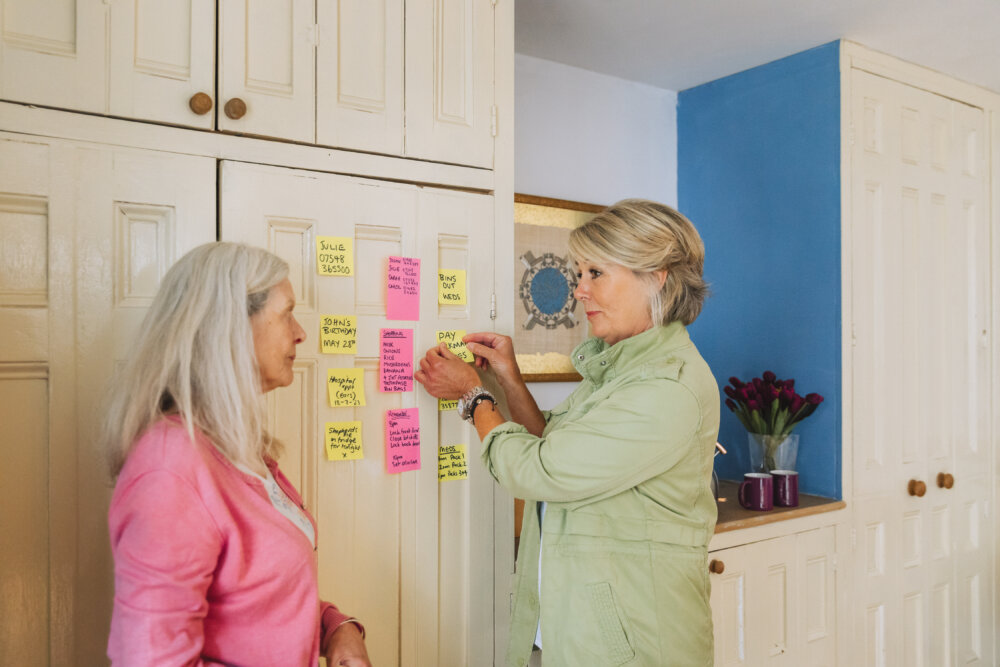Caring for someone with dementia at home
Learn more about the rewards, challenges and complications of caring for someone with dementia in your own home.

Providing care at home for a loved one living with dementia
Becoming a carer for a loved one with dementia has many ups and downs. While it allows you to spend quality time with them and feel assured that they are always taken care of, it can also be extremely difficult to witness the cognitive decline and advancing physical needs of someone you love.
With so many emotional elements to think about, we want to demystify the practical side of caring for someone with dementia at home, so here, you will find everything you need to know about noticing the signs that your loved one may need more support, how to get them to accept home care from you, how to organise a Care Needs Assessment, the ways in which you can help your loved one, how to arrange end-of-life care when it is needed, and the support and respite options available for unpaid home carers.
At Home Instead, our aim is to help people age positively and in place by bringing expert care to their home. For nearly 20 years, we have been providing the highest standard of care, and creating industry-leading training programmes for our Care Professionals that are accredited by nursing and medical professionals. Today, we are the world’s largest global home care network, supporting over 100,000 older adults with personalised, tailored care at home. So whatever questions you have about dementia care, we can help.
How do you know if someone needs dementia support?
Dementia is a progressive disease, and while in the early stages it may cause only mild symptoms, over time these will escalate until the person requires additional care. Some common signs and symptoms of dementia include things like memory loss, communication issues, impaired decision making, mood and personality changes, lack of interest in activities, and struggles with daily tasks.
You can learn more about the different types of dementia and how they progress in our articles: The Different Types Of Dementia and Managing The Stages Of Dementia
Symptoms can appear early, but others won’t be noticeable until the later stages of dementia, so it can be difficult to determine when a loved one may need further care and help at home. If you are starting to notice cognitive and behavioural changes in them and you are worried about their safety living independently at home, evaluating their needs could be a positive next step. This involves a Care Needs Assessment (more on this later).
A person with dementia may need:
- Practical support, such as reminders to do certain things
- Social support, such as help to attend local groups or maintain attendance at church
- Emotional support, such as maintaining focus on the positives where possible
- Healthcare support, such as eating a healthy diet or moving around
You may also find this article helpful: Do I Need A Carer? How To Tell If You Or A Loved One Needs Support

What if my loved one doesn’t accept that they have dementia?
There are many reasons someone may struggle to or refuse to accept that they have dementia and need more help, and understanding these reasons can help you to empathise and provide reassurance. Denial is often a coping mechanism to protect a person’s sense of identity and autonomy, and their reasons for this may include:
- A fear of losing their independence
- A fear of not being able to do activities they enjoy
- A fear of loss of dignity
- Guilt about receiving care (studies show care receivers often feel guilty about receiving more care than they can give in return)
- Concerns about stigma
- A fear that loved ones will visit less
- A dislike of strangers in the home
- Worries about paying for care – you may find our guides on both the cost of home care and paying for home care helpful when discussing with them.
While it can be frustrating when a loved one does not accept their diagnosis, it is important to approach the conversation with empathy and patience so you can express your concerns gently and focus on a solution that works for both of you.
Organising a Care Needs Assessment can also be a good way to bring in insights from trusted healthcare professionals that may support your suggestion for additional care needs.
If your loved one continues to refuse care, you may find our article on this helpful: The Care Discussion: How To Handle An Older Relative Refusing Care
How do I get a Care Needs Assessment for a loved one with dementia?
A Care Needs Assessment is an assessment to find out what a person needs for their health-related care and social support. This assessment will take into account things like:
- Their mobility needs (i.e. could they benefit from home adaptations?)
- Their communication needs (i.e. do they need companionship?)
- Their personal care needs (i.e. are they struggling with washing and dressing?)
- Their medical conditions (i.e. do they have any medical concerns requiring medication or check-ups?)
Someone with dementia can benefit from a Care Needs Assessment as their symptoms progress and they need more help in these areas. Their local community healthcare team (regulated by Integrated Care Systems) can help to arrange a Care Needs Assessment, or you can contact the local authority on behalf of a loved one to arrange this if you think they may be struggling to cope due to their dementia diagnosis.
You can learn more about this process and how to organise it in our guide to the Care Needs Assessment.

How can I help my loved one with dementia care?
Supporting a loved one with dementia is challenging, but there are many ways you can help them at home whether you are caring for them full-time, or sharing the duties with other family members or a home care service. The help they need will depend on the stage of dementia they are experiencing, which could be early, middle or late stage.
In the early stages of dementia, it can help to:
- Try to enable them to maintain their independence and normality as much as possible
- Establish familiar routines to provide comfort and stability in their daily life
- Encourage engagement in activities they enjoy to stimulate cognition and foster a sense of purpose
- Offer emotional support, validate their feelings, and acknowledge their experience with compassion
- Encourage them to help with tasks like shopping for groceries, setting the table, and walking the dog if they can
- Implement memory aids like labels and calendars
In the middle stages of dementia, it can help to:
- Simplify tasks and their environment to minimise confusion and frustration
- Ensure their safety at home by removing hazards
- Ensure they are drinking enough throughout the day to avoid things like headaches and constipation
- Ensure they are eating enough throughout the day – our guide on handling appetite loss in the elderly might help.
- Clearly label all areas of the house and useful items to make it easier for them to locate what they need
- Assist with getting washed and dressed each day
- Help calm them if they suffer from something called “sundowning” – you can read more about this here: What is “Sundowning” In Dementia?
In the late stages of dementia, it may help to:
- Coordinate medical professionals visiting the home to provide medication and pain relief
- Provide companionship to avoid the person feeling isolated or scared when confused
- Make necessary adjustments to the home to ensure their safety, especially if they are prone to walking around unaccompanied
- Help them around the home if they are experiencing mobility issues or a complete loss of their ability to walk
- Be present during mealtimes if they are struggling to swallow food
- Assist with incontinence issues or getting to the bathroom if they need help or forget where this is
- Ensure their personal care needs are taken care of to avoid infections and other complications
Everyone’s symptoms and level of competence is entirely different depending on their health and the stage of dementia they are in, so although a Care Plan can help to structure a person’s care, it is important to remember that caring for someone with dementia requires flexibility and the ability to pivot or adapt when changes occur.
You may find our article useful: Building A Care Plan For A Dementia Patient At Home
Is there any help available for those caring for someone with dementia?
If you are caring for someone with dementia, you should never feel alone in doing so, as there are support options that could help such as home care services, respite care, and financial assistance.
Research shows that family caregivers of patients with dementia tend to experience social isolation, physical health deterioration, and psychological disorders like depression, so it is vital to take care of your own mental health throughout all stages of a loved one’s dementia, even if you feel too busy or stressed to do so.
Some of the options available to you include:
- Home care – Your local council will be best placed to assess what your loved one needs and the care they can provide. This could look like a regular home carer visiting on a weekly basis, several days a week, or even a full-time carer if you feel unable to cope.
- GP support – Tell your GP that you are a carer for a loved one with dementia. By registering as a carer, you may be able to gain access to helpful information from your GP, plus support opportunities and benefits such as free annual health checks. You may also be able to access community services like support groups, counselling and educational programs that are specifically created for caregivers to provide emotional support for this challenging position.
- Carer’s Assessment – You can organise a Carer’s Assessment which looks at the work you are doing and offers a chance to discuss your needs with your local council to gain additional support.
- Financial support – Carers can access financial benefits like the Carer’s Allowance. Alzheimer’s Society estimates there are around 700,000 unpaid carers in the UK looking after people living with dementia, so if you fall under this category be sure to look into what you may be entitled to.
- Respite care – This is available for carers who need to take time off whether for an illness, a special event, a holiday, or something else. You should not feel required to take on all caring responsibilities without breaks, so remember respite care is available to you should you need it. You can learn more in our article: What Is Respite Care?
You can find additional information for carers through organisations like:
How do you know when end-of-life care is needed?
End-of-life care is required when someone is going through the final stages of an incurable illness, and needs specialist care to manage their pain and comfort as they approach the end of their life.
Recognising the need for end-of-life care can be difficult, and will often be informed by medical professionals looking after your loved one’s medical needs in the late stages of dementia. Progressive decline in cognitive ability, loss of appetite, difficulty swallowing, and increased pain can indicate signs of the person approaching the end of their life, which is when end-of-life care will be implemented.
As early as you can, you should organise for an End of Life Care Pathway document to be created so that everyone involved in this stage of care understands what needs to happen based on the person’s personal wishes and requests. Planning ahead for this eventuality ensures your loved one will receive what they need and want, with their wellbeing prioritised and their dignity maintained.
You can read more about how to plan for end-of-life care in our article: Understanding The End Of Life Care Pathway
Home Instead is an award-winning home care provider and part of a worldwide organisation devoted to providing the highest-quality relationship-led care for older people in their own homes. Arranging care for yourself or your loved one shouldn’t be stressful, so whatever questions you would like answered, feel free to reach out to the Home Instead team to discuss your needs.

Tim Howell , Learning and Development Partner
For the past 16 years, I have been dedicated to the care sector, progressing from Care Professional to Care Manager, and later assuming roles such as Specialist Training Manager. Currently, as a Learning and Development Partner at Home Instead’s National Office, I develop and review training programs, collaborate with external organizations like the Alzheimer’s Society, and manage various impactful projects.
My passion for dementia care has guided much of my work, from engaging with advanced dementia support initiatives, such as those offered by the End of Life Partnership, to staying informed through events like the annual Dementia Summit. These efforts reflect my deep commitment to enhancing the care and quality of life for individuals living with dementia